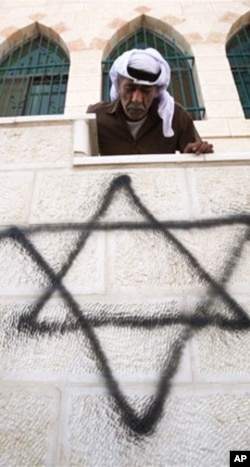The debate over Palestinian statehood continues with Israel and the Palestinian authority laying claim to parts of what has traditionally been called the Holy Land or the Land of Promise. Religion is one of the centerpieces in that debate, and experts say that both sides will have to find middle ground if there is to be any hope for a peaceful resolution.
The Land of Promise
The Hebrew Bible records the promise in the book of Genesis, where God tells the patriarch Abraham:
“I will give unto you and to your seed after you, the land wherein you are a stranger, all the land of Canaan, for an everlasting possession; and I will be their God. (Gen. 17:8)
In Islam, the land is called the Holy Land and is mentioned specifically when Moses proclaims to the Children of Israel:
"O my people! Enter the holy land which Allah hath assigned unto you, and turn not back ignominiously, for then will ye be overthrown, to your own ruin." (Surah 5:21)
Religion and Politics
But what role does faith play in the current political debate? And is there hope that believers of two Abrahamic faiths can reach a compromise?
For insight on those questions, we talked to Georgetown University professor John L. Esposito, the director of the Prince Alwaleed Bin Talal Center for Muslim-Christian Understanding. He says that though Judaism and Islam share some tenets, the argument over the land, particularly areas like the West Bank and East Jerusalem, is more political and socio-economic, not religious.
Watch our interview with John L. Esposito:
“And that colors – regrettably – the whole scene … not just because you have some people who are religious players even though this is, primarily the majority of the forces are more nationalists, secular nationalists. But it also colors it in terms of the way it plays out in the Muslim world, and also often in the popular mind,” Esposito said.
The Georgetown scholar went on to say that leaders on both sides of the debate have played what he called “the religion card” using faith references to rally support for political causes.
Religion’s role
But what role should religion have in public discourse? In the United States, President Thomas Jefferson put forth the idea of a “wall of separation” between religious and civil authorities, a concept adopted in numerous variations by other countries. But is such a separation the only way?
To explore the issue, VOA turned to Harvard professor Monica Duffy Toft and another Georgetown scholar, Timothy Shah. Toft and Shah wrote the book God’s Century: Resurgent Religion and Global Politics along with Notre Dame Professor Daniel Philpott.
In the book, the authors argue that contrary to the belief that secularism will help breed democracy, religious faith has helped spur movements calling for more human rights, more freedoms and peace.
However, the authors do not ignore violence and war in the name of religion. Duffy Toft, from Harvard’s Belfer Center Initiative on Religion and International Affairs, says that religious people have had both positive and negative effects on democratization in the past 100 years.
“Religious actors are there, promoting democracy, and mediating peace and healing the wounds of war, but they have also been implicated in violence,” she said.
“And where religion is a source of violence, again it results from the same factors that explain democracy and peace. You actually have to look at what the actors, the beliefs behind their behavior, what are they doing,” the scholar added.
Paradoxically, Duffy Toft and her colleagues also found violence is more likely when governments are too closely affiliated with a particular religious movement.
But Shah, an associate director of the Religious Freedom Project at Georgetown’s Berkley Center for Religion, says they also found that when there is freedom of religion, democracy flourishes.
“It is hard to resist the conclusion that the most aggressively secularizing and secularist movements, regimes and ideologies were profoundly anti-democratic and pro-authoritarian,” Shah said.
“Meanwhile, some of the most politically active, assertive and mobilizing religious movements have been pro-democratic and anti-authoritarian,” the Georgetown scholar added.
Tolerance v. conflict
In the case of Israel and the Palestinians, John Esposito says that religious believers have to find a way to respect and understand those who do not adhere to their particular tenets.
“I mean, the real challenge that we face in Palestine and Israel is analogous, I think, to the challenge we face in today’s world, and that is one of a modern notion of religious pluralism, and a modern notion of religious tolerance based on mutual understanding and respect,” he said.
“Not tolerance based simply on co-existence,” Esposito explained.
“Because tolerance based on co-existence means that you are out to co-exist, it doesn’t mean that I like you, I may look down on you, and I may despise you. I wouldn’t want to have you live near me. But it’s got to be one that is based on that mutual understanding and respect,” the scholar added.
U.S. position
As far as U.S. foreign policy is concerned, Duffy Toft, Shah and Esposito agreed that clinging to a “secular only” philosophy would be short-sighted, because of the role that religious people play in political decision making.
All three scholars said that extremism should not have a place in the future of the Middle East. While acknowledging that some factions might advocate violence as a means to a political end, Duffy Toft, Shah and Esposito agreed that only an environment of freedom and respect – for all faiths – will help bring about the peace that has eluded the region.




